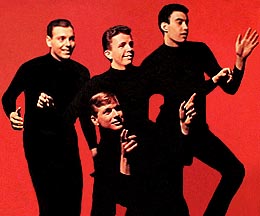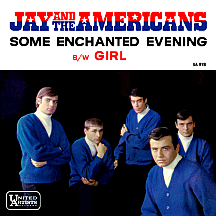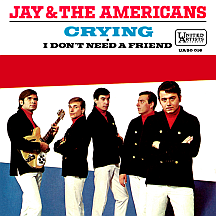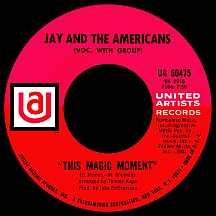JAY AND THE AMERICANS
In the early 1960s, there was a singer named John, another singer named David and a guy named...Binky!? Somehow these three names were boiled down to "Jay" and paved the way for Jay and the Americans' successful run from 1962 until 1970. Brooklyn-born John Traynor broke into the business in '61 when Phil Cracolici, a singer for The Mystics (of the 1959 hit "Hushabye"), broke away from the Brooklyn group, leaving manager Jim Gribble scrambling for a replacement (Gribble also managed Tico and the Triumphs and had talked that band's lead singer, Paul Simon, into temporarily filling in). Traynor auditioned and was hired, but made only one record with the Mystics before moving on.
Sydelle Sherman was the female lead singer of The Harbor Lights, named for the Belle Harbor area of Queens, New York, near Rockaway Beach. Cut in the same mold as Phil Spector's Teddy Bears, the group featured backup bookends Sandy Yaguda and Kenny Rosenberg and recorded one unsuccessful single on the Jaro label in 1960. They crossed paths with Traynor during a Mystics show and hit it off, forming a new group; Yaguda started going by the name Sandy Deane and Rosenberg became Kenny Vance; Howard Kerschenbaum joined and, like the others, ditched his lengthier moniker in favor of Howie Kane.
Jerry Leiber and Mike Stoller were moonlighting at United Artists as a sideline to their more successful Atlantic label productions; the songwriting superteam had made a clean break from Atlantic by mid-1961, but at that point only The Clovers' "Love Potion No. 9," their first UA-affiliated project, had come through, and another two years had already passed. Jerry and Mike liked the guys and got them in the door at the label while coming up with a simple, straightforward name for the act: The Americans.
United Artists, one of the top movie studios, established its record division in 1957 for the purpose of releasing soundtrack albums of the company's film scores. West Side Story, which premiered in October 1961, became the studio's biggest moneymaker, but due to a licensing issue the soundtrack was released on Columbia Records (same as the 1958 Broadway cast album had been). UA made efforts to promote and further monetize its hot property by targeting top 40 radio with a version of "Tonight," the show's standout number. The newly-signed foursome got the nod. Leiber and Stoller, ever the jokesters (they masterminded that long run of crazy Coasters hits), decided to rename the group Binky Jones and the Americans. Traynor protested, putting his career on the line in the process, by insisting he wasn't going to be known as "Binky" for the rest of his life! He suggested his childhood nickname, J.T., or perhaps the even simpler Jay; the group became Jay and the Americans and people still aren't sure whether Jerry and Mike's suggestion was serious or they were just pulling a prank.
A few weeks before West Side Story hit theaters, "Tonight" was released but met with resistance from radio stations; the label made an instrumental-with-chorus version by proven hitmakers Ferrante and Teicher its priority and it caught on, reaching the top ten in December '61, just as the film was tops at the box office on its way to winning ten Academy Awards, the most ever for a musical film. Jay and the Americans bounced back with "Dawning," which got off to an even slower start than the first single. Stations began to play the flip fide, "She Cried," written by Greg Richards and Ted Daryll. Traynor's vocal was delivered with a quivering, emotional quality ('And when I told her I didn't love her anymore...') that connected with listeners. It went top ten in May '62.
Notching a follow-up hit wasn't easy. For Traynor, in fact, it proved impossible. "This is It," an Ellie Greenwich-Tony Powers tune, had a nice vocal group blend but fourth single "Tomorrow," another Richards-Daryll effort, proceeeded at a painfully slow pace; neither made a dent in the charts. The pressure took its toll and the group began arguing among themselves. Traynor decided to quit, a decision he later regretted. The search was on for another guy named Jay...or someone who at least wouldn't mind answering to that name.
Guitarist Marty Sanders, who'd played on some of the group's sessions, suggested a singer who might fit in. He and David Blatt had performed together as The Two Chaps before forming The Empires, a briefly-realized Epic act with one 45 release, "Punch Your Nose," in early '62. Blatt was hesitant at first; a deep-seated fear of performing for audiences had always been an issue. When he finally came around to audition for the guys, he sang "Cara, Mia" (composed by Bunny Lewis and Mantovani under the pseudonyms Tulio Trapani and Lee Lange, it had been top ten hit for British singer David Whitfield in 1954) impressing everyone in the room, and within a block in any direction, with his ability to hit and hold the high notes. They hired him on the spot. Sanders also joined, and the group became a quintet.
So first Jay John was replaced by second Jay David. "Strangers Tomorrow," the initial single by the new J&A, didn't click and the guys had to consider there might never be anything beyond "She Cried." The Drifters had just recorded Leiber and Stoller's "Only in America," but Atlantic didn't release it, concerned that audiences wouldn't accept the lyrics, 'Only in America can a kid without a cent...get a break and maybe grow up to be president,' as sung by an African-American act. After all, nothing like that was ever going to happen, right? Leiber and Stoller decided it made sense for a group called the Americans to record the song and had them do it to the same backing track the Drifters had used. The record hit the charts in August 1963, coincidentally just a couple of weeks before the Civil Rights March on Washington (and Reverend Martin Luther King's historic "I Have a Dream" speech). Perhaps the Drifters' version would have been welcomed after all. At any rate, it put Jay and the Americans back into the top 40 and bought Blatt a little more time to settle in as lead singer.

Leiber and Stoller didn't seem to want to give up on the formulas they had dominated with in the 1950s; after "Come Dance With Me" (which resembled the Drifters' chart-topper "Save the Last Dance For Me" just a little too much) and one other single, they had Jay and the group record the Tommy Boyce, Bobby Hart and Wes Farrell-penned "Come a Little Bit Closer," thematically in keeping with their mid-'50s-produced hits "Smokey Joe's Cafe" by The Robins and "Down in Mexico" by The Coasters (both had taken place in a tavern and/or eatery not unlike the setting of the newer song); the Marty Robbins hit "El Paso" is also an obvious influence. Produced by Artie Ripp under Leiber and Stoller's supervision, the recycled story of a tempting south-of-the-border vamp and "Bad Man Jose" worked; in the midst of the fall '64 British Invasion and Motown madness, the single rose to number three on the charts, becoming the biggest hit of all time for Jay and the Americans.
Hits kept coming, though intermittently. "Let's Lock the Door (And Throw Away the Key)," written by Farrell and Roy Alfred, came close to the top ten a few months later, breaking the band's previous inability to land two back-to-back hits. Blatt, now calling himself Jay Black, had been trying to convince Leiber and Stoller to let him do "Cara, Mia," a highlight of the group's stage shows since the beginning, but they simply didn't have a feel for that 1950s operatic-pop vibe. Gerry Granahan, former leader of late-'50s act Dickey Doo and the Don'ts, was persuaded to produce the song and it ended up on the B side of J&A release "When it's All Over." Once disc jockeys became aware of Jay Black's vocal histrionics, they began playing "Cara, Mia" without any concern as to whether a modern operatic opus would fit into the British and/or folk-rock environment of '65. The song was a top ten hit in July.
An even older song was revived for the next single. "Some Enchanted Evening," from the 1949 Broadway musical South Pacific and a hit that year for several artists including Perry Como, who took it to number one, again showed off Jay's multi-octave range and hit the top 20 in October. As Jay became more comfortable onstage, he indulged another goal, that of acting, and took time off to star in a summer stock production of Bye Bye Birdie without it interfering with his commitment to the band. "Sunday and Me," written by Neil Diamond, also hit the top 20 at the end of year, giving Diamond his first success as a songwriter several months before "Solitary Man" and "Cherry, Cherry" kickstarted his long and lucrative singing career.
After an appearance in the 1966 teen-schlock film Wild Wild Winter, Jay and the Americans remade Roy Orbison's 1961 smash "Crying," which hit the top 40 midyear. Then they endured a couple of uneventful years; Howie departed and Jay made a solo album and single "What Will My Mary Say" (remaking Johnny Mathis's hit from '63). In late 1968, they hit on a plan to revive some of their favorite oldies (late '50s and '60s rock and roll, as opposed to the earlier era they'd previously drawn from). The result was an album called Sands of Time and its first single, Doc Pomus and Mort Shuman's "This Magic Moment." Jay was surprised at the popularity of that particular record, preferring the 1960 original by the Drifters, one of his earliest influences; still, the group's version hit the top ten in February '69 and Jay and the Americans were rolling again.
They followed it with two lesser sellers, "When You Dance" (a hit in '55 for The Turbans) and "Hushabye" (the aforementioned Mystics tune), then reached the top 20 in January 1970 with a soothing interpretation of the Phil Spector-Barry Mann-Cynthia Weil gem "Walkin' in the Rain," a hit in '64 for The Ronettes. Several of the group's recordings during this time featured studio musicians Donald Fagen and Walter Becker, who mounted their own impressive siege on the charts a few years later as Steely Dan. In the spring, "Capture the Moment" became the group's last record to appear on the charts; they had been with United Artists ten years when the label dropped them in 1971. The four remaining Americans went their separate ways two years later. Varying incarnations of the group have toured off and on over the years.
John Traynor, the original Jay, made attempts at a solo career after his early exit, first for the Coral label (his early 1964 single "I Rise, I Fall," credited to JAY formerly of Jay and the Americans, showed promise but ended up being a hit for Johnny Tillotson a few months later) and later for ABC Records and other, smaller record companies. David Blatt, the replacement Jay, made attempts at a solo career in the 1970s as Jay Black, moving from label to label including Atlantic, Private Stock, Roulette, Millenium and Midsong International. He scratched the acting itch one last time in 1977 with a role in Contract on Cherry Street, a TV movie starring Frank Sinatra.
NOTABLE SINGLES:
- Tonight - 1961
- She Cried - 1962
- This is It - 1962
- Only in America - 1963
- Come Dance With Me - 1963
- Come a Little Bit Closer - 1964
- Let's Lock the Door (And Throw Away the Key) - 1965
- Think of the Good Times - 1965
- When it's All Over /
Cara, Mia - 1965 - Some Enchanted Evening - 1965
- Sunday and Me - 1965
- Why Can't You Bring Me Home - 1966
- Crying - 1966
- Livin' Above Your Head - 1966
- (He's) Raining in My Sunshine - 1966
- (We'll Meet in The) Yellow Forest - 1967
- No Other Love - 1968
- This Magic Moment - 1969
- When You Dance - 1969
- Hushabye - 1969
- Walkin' in the Rain - 1970
- Capture the Moment - 1970




